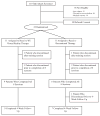Effectiveness of virtual reality using Wii gaming technology in stroke rehabilitation: a pilot randomized clinical trial and proof of principle
- PMID: 20508185
- PMCID: PMC4879973
- DOI: 10.1161/STROKEAHA.110.584979
Effectiveness of virtual reality using Wii gaming technology in stroke rehabilitation: a pilot randomized clinical trial and proof of principle
Abstract
Background and purpose: Hemiparesis resulting in functional limitation of an upper extremity is common among stroke survivors. Although existing evidence suggests that increasing intensity of stroke rehabilitation therapy results in better motor recovery, limited evidence is available on the efficacy of virtual reality for stroke rehabilitation.
Methods: In this pilot, randomized, single-blinded clinical trial with 2 parallel groups involving stroke patients within 2 months, we compared the feasibility, safety, and efficacy of virtual reality using the Nintendo Wii gaming system (VRWii) versus recreational therapy (playing cards, bingo, or "Jenga") among those receiving standard rehabilitation to evaluate arm motor improvement. The primary feasibility outcome was the total time receiving the intervention. The primary safety outcome was the proportion of patients experiencing intervention-related adverse events during the study period. Efficacy, a secondary outcome measure, was evaluated with the Wolf Motor Function Test, Box and Block Test, and Stroke Impact Scale at 4 weeks after intervention.
Results: Overall, 22 of 110 (20%) of screened patients were randomized. The mean age (range) was 61.3 (41 to 83) years. Two participants dropped out after a training session. The interventions were successfully delivered in 9 of 10 participants in the VRWii and 8 of 10 in the recreational therapy arm. The mean total session time was 388 minutes in the recreational therapy group compared with 364 minutes in the VRWii group (P=0.75). There were no serious adverse events in any group. Relative to the recreational therapy group, participants in the VRWii arm had a significant improvement in mean motor function of 7 seconds (Wolf Motor Function Test, 7.4 seconds; 95% CI, -14.5, -0.2) after adjustment for age, baseline functional status (Wolf Motor Function Test), and stroke severity.
Conclusions: VRWii gaming technology represents a safe, feasible, and potentially effective alternative to facilitate rehabilitation therapy and promote motor recovery after stroke.
References
-
- Nichols-Larsen DS, Clark PC, Zeringue A, Greenspan A, Blanton S. Factors influencing stroke survivors’ quality of life during subacute recovery. Stroke. 2005;36:1480–1484. - PubMed
-
- Langhorne P, Coupar F, Pollock A. Motor recovery after stroke: a systematic review. Lancet Neurol. 2009;8:741–754. - PubMed
-
- Barreca S, Wolf SL, Fasoli S, Bohannon R. Treatment interventions for the paretic upper limb of stroke survivors: a critical review. Neurorehabil Neural Repair. 2003;17:220–226. - PubMed
-
- Wolf SL, Winstein CJ, Miller JP, Taub E, Uswatte G, Morris D, Giuliani C, Light KE, Nichols-Larsen D. Effect of constraint-induced movement therapy on upper extremity function 3 to 9 months after stroke: the EXCITE randomized clinical trial. J Am Med Assoc. 2006;296:2095–2104. - PubMed
-
- Jutai JW, Teasell RW. The necessity and limitations of evidence-based practice in stroke rehabilitation. Top Stroke Rehabil. 2003;10:71–78. - PubMed
Publication types
MeSH terms
Grants and funding
LinkOut - more resources
Full Text Sources
Medical


